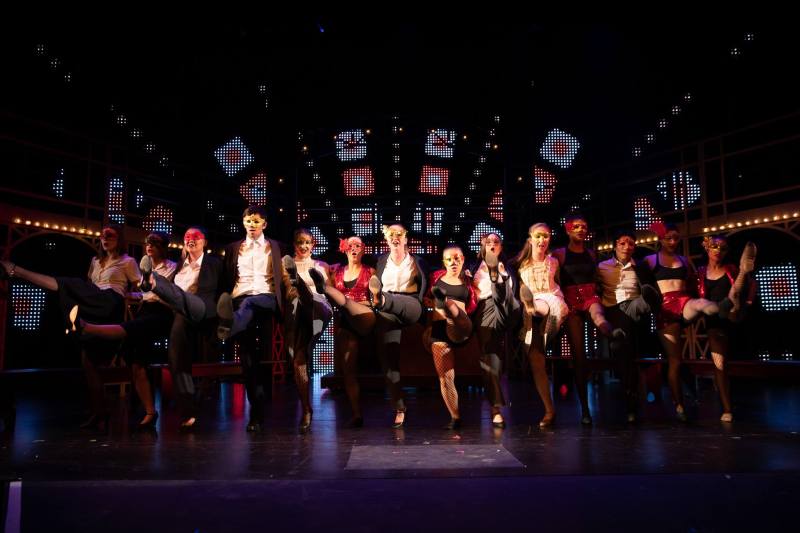Ram’s Head Theatrical Society presents “Chicago,” a partly satirical musical about murderesses Velma Kelly (Isabela Angus ‘20) and Roxie Hart’s (Evie Johnson ‘20) experiences in the prison and criminal justice systems. The musical is the collaboration of Fred Ebb (lyrics and book), Bob Fosse (book) and John Kander (music).
The set consisted of an exposed brick background, large, rectangular light up panels and a gray bridge-like structure with identical spiral staircases on both stages left and right. Three cooper-toned, dim hanging lights dropped from the ceiling while other stage lights emitted deep red, electric blue and magenta hues, varying based on what was occurring in the musical.
The show began with the Master of Ceremonies (Audy Mulia ‘18), setting the tone with the following statement: “Welcome. ladies and gentlemen, you are about to see a story of murder, greed, corruption, violence, exploitation, adultery, and treachery — all those things we all hold near and dear to our hearts.” The orchestra began to play the overture as members of the dance ensemble emerged — one by one — through a trapdoor, wearing all black garments: bodysuits, garter belts, blacks tights. Then, the music transitioned into “All That Jazz”, a song that captures the toothsome dangers and stubborn childishness of the Roaring Twenties.
In the first act of “Chicago,” the audience is introduced to eccentric (and sleazy) characters like the murderesses, Matron “Mama” Morton (Evan Miller ‘20) and Billy Flynn (Sam Roach ‘21). The audience is an insider, witnessing — sometimes in real time, other times in flashback — the crimes of the murderesses, and seeing the process of “Mama” and Flynn as they not only try to help the murderesses win their trials and make money, but also try to profit off of them by making the women into so-called “celebrity criminals.” The first act was energizing and outrageous.
Then, there was a tonal change at the beginning of the second act. Suddenly, the story was darker, the characters are more nuanced and the messages of the show begin to become apparent.
During intermission, I heard the woman beside me say to her friend: “It’s like a full-time job,” referring to the performers’ commitment. I’ve been in rehearsals for my debut in a Stanford production (“The Good Person of Szechwan”), and I can affirm that it takes time, and is tiring, but it’s so fun that it doesn’t actually feel like work. The performers in “Chicago” are evidence of this. They brought a playfulness to their characters, showing that they were having fun, but they were also calculated. They demonstrated excellent comedic timing, attempted to reach every part of the room through their interactions with the audience and never missed a beat in the choreography.
At one point during the show, there were technical difficulties, and the background music was louder than the performers’ microphones. These kinds of unpredictable snafus happen during all shows, and can easily have negative impacts on the audience’s attention and ability to follow the story. However, the performers in “Chicago” handled the situation masterfully, continuing on, and giving the audience a good show despite the technical difficulties.
Being at “Chicago” reminded me about why I wanted to write reviews in the first place. I didn’t become a reviewer to necessarily make value judgements about performances, but to learn and to be a part of the community in hopes of sharing my insights, and encouraging others to get more involved with campus life. Through songs like “We Both Reached for the Gun,” a number where Flynn acts as a puppeteer, feeding Hart the lines she should say to reporters, to songs like “Roxie,” a number where Hart sings about the life she hopes to have, the performers brought the commitment to the show front and center.
At “Chicago,” I learned that even characters like Kelly and Hart, with bad intentions and flimsy morals, can teach us things. For example, maybe there is strength in being “[your] own best friend,” and perhaps we could all love someone who, when we see ourselves in their eyes, looks at us as if we were still a kid. That yearning for youth that was so prevalent in pieces from the 1920s, maybe that never went away.
If you have the chance, go and see “Chicago” at Memorial Auditorium April 19, 20 and 21. Tickets are available online.
Note: a previous version of this article incorrectly listed one of the show’s characters as Bob Flynn. The correct name is Billy Flynn.
Contact Chasity Hale at cah70352 ‘at’ stanford.edu.
